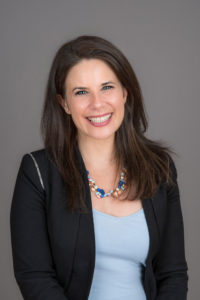
She’s never been a CEO before. She’s taking over for the woman who built the nonprofit organization, Moving Traditions, from nothing. And the task before her, from the board of directors, is no less than to expand the organization to communities all over North America.
But Shuli Karkowsky says she is ready.
According to Deborah Meyer, Karkowsky’s predecessor at the Elkins Park nonprofit, as well as the board’s search committee, Karkowsky is the ideal leader to guide Moving Traditions forward. The new CEO’s professional network recognized the same thing: When Meyer announced her retirement, connections started reaching out to Karkowsky to encourage her to apply.
And she agreed.
At the time, Karkowsky was the executive vice president of Hazon, a New York City-based environmental advocacy organization, overseeing more than 50 staff members and a budget that exceeded $9 million. After handling those responsibilities for more than two years, she believed she was ready to be the boss.
Karkowsky also believed in Moving Traditions’ mission of giving teenage Jews a space to work through their feelings, figure out their identities and then manifest them through positive community work.
“I wanted to take the best job in the world,” she said.
On Feb. 7, she did. But luckily for Karkowsky, Meyer is sticking around until March 31 to train and help her.
The new CEO, 38, is embracing the insights of her soon-to-be emeritus mentor; it was Meyer who created the organization in the early 2000s as a program for teenage girls to talk about their emotions.
Meyer, a longtime community activist, noticed increasing rates of anxiety and depression in the youth population. She responded by opening a space for girls to discuss friendship, academic pressure, gender and sexuality, among other topics. The CEO also rooted the conversations in Jewish values like shleimut (wholeness), hesed (caring) and tzedek (justice).
Those values challenged teens to think Jewishly even after their bat mitzvahs, according to Meyer. The leader kept repeating the same questions in her head as she considered the importance of her program.
Why isn’t Jewish education focusing on what it means to be a teen and a human being? Why are we letting kids drop out after their bar or bat mitzvahs?
“If you drop out, you haven’t really had a chance to talk about sexuality, how to be a responsible member of society, how to advocate for a better world,” Meyer said. “We wanted to bring Jewish values and the adolescent experience together.”
That approach was successful, as Moving Traditions grew from girls to boys, too, and then to pre-teens preparing for their bar and bat mitzvahs, and finally to other parts of the country. Today, the organization serves more than 5,000 kids a year in 29 states on a budget of $3.6 million.
Meyer’s legacy is in those numbers. But really, it’s deeper than that, according to Darcie Crystal, the chair of the nonprofit’s board of directors.
It’s in the thousands of kids who Moving Traditions has helped, Crystal said.
“She gave teens a space to explore their identity,” she said. “She saw a need in the Jewish community and built an organization to address that need.”
But Meyer’s life’s work was only part one, according to Meyer herself.
On a group call with Karkowsky listening in, Meyer said, “Shuli’s going to get us in all 50 states.” And the new leader did not try to downplay that expectation. Just as she’s ready to be a CEO, she’s ready to do what a CEO does: find new territory.

Karkowsky wants to use Moving Traditions’ mental health-enhancing programs to “give parents confidence to parent correctly,” she said; to convince schools to “take elements of our program and reeducate young people,” she added; and to simultaneously “stay in Philly but have a national impact,” she concluded.
The former corporate lawyer has a three-year plan to double engagement. She wants to start by increasing enrollment in Moving Traditions’ core programs and then pitch its approach to Jewish schools.
“Feminism, gender identity, self-acceptance — all the pieces that help young people help themselves — if they were implemented more broadly, I’d feel good about the future of Jewish education,” Karkowsky said.
According to the CEO, the nonprofit conducts studies and surveys that show that its programs enhance mental health and a sense of security in teens. It’s just a matter of proving this to more and more people.
Meyer said she sees parents as partners, and Karkowsky agrees. But the new CEO also said that parents “don’t always have the language to talk to their kids.”
The famous “sex talk” is a good example of this problem, Karkowsky said.
“You want children to understand that it’s not something they should be cavalier about, but you don’t want to stigmatize it,” she said. “That’s a hard balance to walk.”
Moving Traditions tries to help parents achieve this balance, she added. The more it succeeds, she explained, the more it will make kids feel comfortable expressing their true identities.
Karkowsky herself is a mother of three children, ages 7, 7 and 2. She already sees her son lowering his voice around bigger kids, and her daughter becoming conscious of how her non-feminine interests, like Legos and martial arts, make her different.
“I’m seeing these forces bloom in my own life,” the mother said. “I’m seeing how early in their lives social influences start to affect them.”
As a mom, Karkowsky knows she will love her kids “no matter what,” she added. Her goal with Moving Traditions is to “create a world where every young person feels that security from the people around them,” she concluded. JE
[email protected]; 215-832-0740






